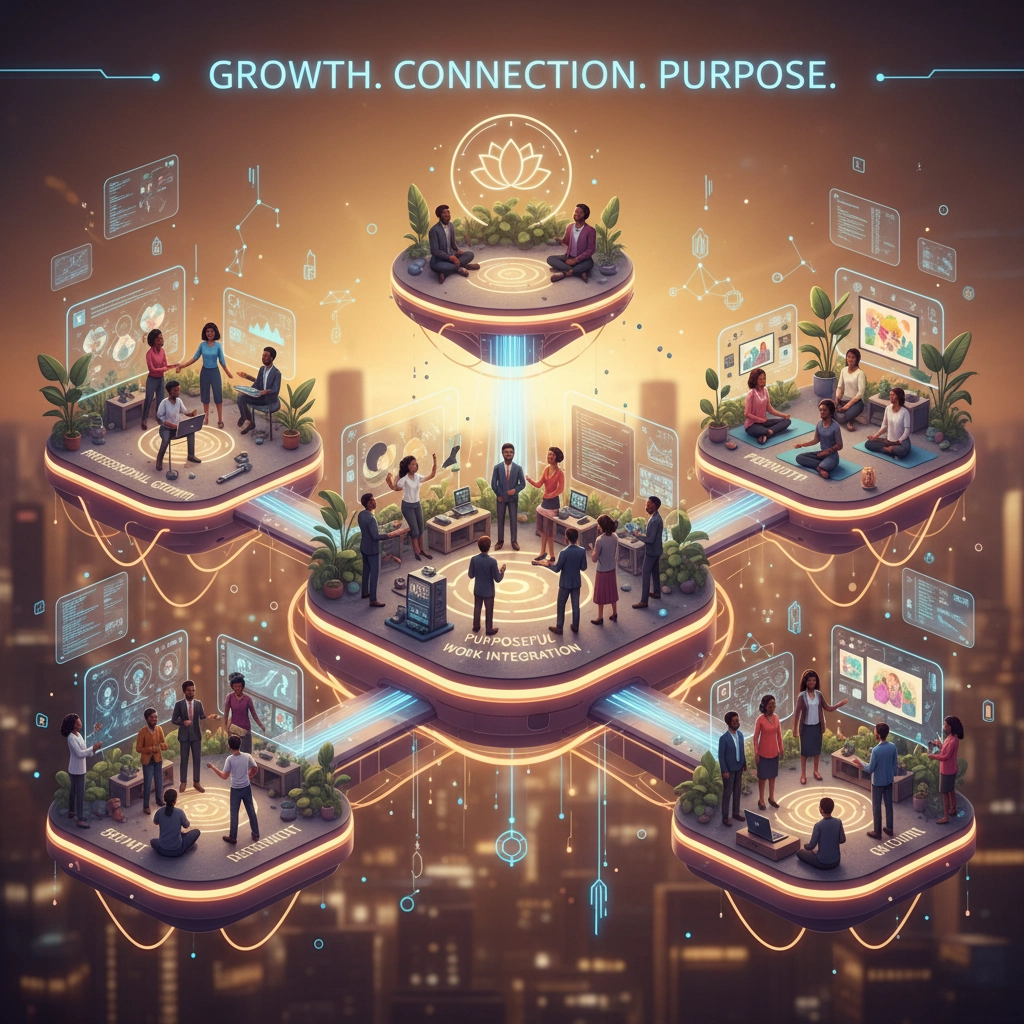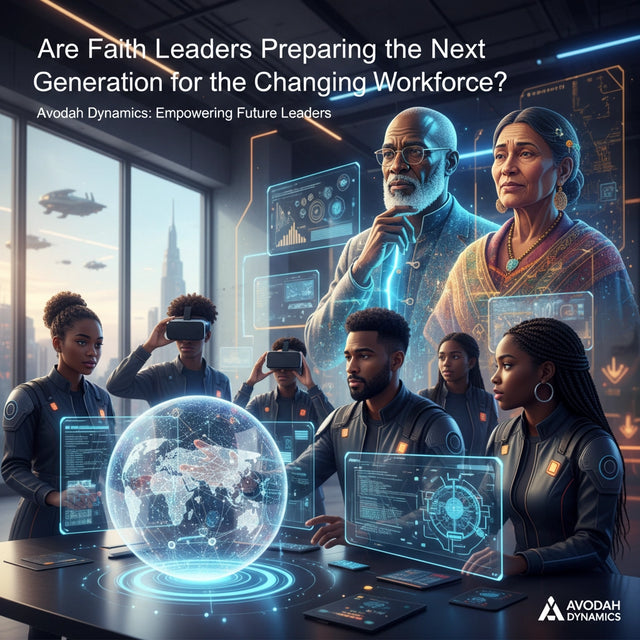Are Faith Leaders Preparing the Next Generation for a Changing Workforce?
The workplace is evolving faster than ever, and Gen Z is leading the charge. They're not just entering the workforce: they're reshaping it with demands for flexibility, purpose, and authentic leadership. But here's the million-dollar question: Are faith leaders actually preparing this generation to thrive in tomorrow's professional landscape while staying rooted in their values?
The honest answer? It's complicated. Some Christian organizations are absolutely crushing it, while others are still figuring out how to bridge Sunday sermons with Monday morning meetings. Let's dive into where we stand and what needs to happen next.
The Current Reality Check
Right now, we're seeing a mixed bag across Christian organizations and churches. According to the State of the Christian Workplace 2025 report: which gathered feedback from nearly 160,000 employees: one-third of Christian-led organizations fell below the healthy threshold for workplace culture and engagement. That's not exactly the testimony we want to be known for.
The problem isn't lack of good intentions. Most pastors and faith leaders genuinely want to see their people flourish. The issue is that many haven't connected the dots between spiritual formation and professional preparation. We've gotten comfortable keeping faith and work in separate boxes, but Gen Z isn't buying that compartmentalized approach.

Gen Z Is Already Here: And They're Taking Charge
Let's get real about the numbers. Generation Z now makes up 20% of the U.S. workforce, and they're projected to hold 10% of managerial roles by 2025. These aren't kids waiting for their turn: they're already leading teams, starting businesses, and making decisions that impact entire organizations.
This generation brings a completely different leadership style to the table. They prioritize adaptability, collaboration, equity, inclusion, flexibility, well-being, and social impact. They want to work for organizations that align with their values, and they're not afraid to walk away if there's a mismatch.
For faith leaders, this presents both an incredible opportunity and a significant challenge. Gen Z Christians are hungry for authenticity and purpose-driven work. They want to see their faith integrated into their professional lives, not just mentioned in passing during workplace prayer meetings.
What's Actually Working
The good news? Some Christian organizations are absolutely nailing this. They're implementing comprehensive wellness initiatives that address spiritual, emotional, and financial well-being. They're investing in continuous learning programs because they know 94% of employees stay longer with organizations that invest in their development.
These forward-thinking faith leaders are embracing what we call "Kingdom Diversity": diversity, equity, and inclusion initiatives grounded in biblical values rather than secular frameworks. They're creating environments where Christ-centered approaches to justice and unity aren't just buzzwords but lived realities.

Values-driven leadership is becoming the norm in these organizations, with 77% of employees reporting that organizational purpose matters to them. Christian leaders are modeling integrity, compassion, and servant-heartedness in ways that younger generations can see and emulate.
Some churches are also stepping up by involving young adults directly in leadership roles and decision-making processes. Instead of waiting until people are 40 to give them significant responsibility, they're empowering the next generation to shape organizational direction and mission right now.
Where We're Still Missing the Mark
But let's be honest about where we're falling short. Too many pastors still haven't figured out how to address the diversity of vocations within their congregations. They can preach about biblical principles all day long, but when it comes to helping a software developer, marketing professional, or healthcare worker connect their faith to their specific workplace challenges: that's where the gaps become obvious.
Most churches lack formal mechanisms to prepare believers for the ethical dilemmas, leadership challenges, and cultural pressures they'll face in their careers. We're sending people into increasingly complex professional environments without giving them the tools to navigate them from a faith perspective.

Another major issue? Many Christian organizations are still relying on secular workplace models instead of developing faith-integrated approaches to leadership development and employee engagement. We're essentially using the world's playbook while slapping a Christian label on it.
Biblical Frameworks That Actually Work
The beautiful thing is that Scripture gives us incredible models for preparing the next generation. Look at Moses mentoring Joshua, Elijah training Elisha, or Jesus developing His disciples. These weren't theoretical leadership programs: they were intentional, relational processes designed to transfer both skill and spiritual authority.
Biblical succession planning isn't just about finding someone to fill a position. It's about identifying people with God-given potential, investing in their character development, providing hands-on experience, and gradually transferring responsibility while maintaining supportive relationships.
The early church understood this. They didn't just preach about workplace integrity: they created apprenticeship models, supported entrepreneurs, and developed leaders who could influence entire industries and regions.
Practical Steps for Faith Leaders
So what does effective preparation actually look like? First, we need to start asking better questions. Instead of "How do I get young people more involved in church activities?" we should be asking "How do I equip them to be salt and light in their specific professional contexts?"
This means developing targeted resources for different vocations. A teacher needs different faith-work integration tools than an engineer. A social worker faces different ethical challenges than a financial advisor. Cookie-cutter approaches don't work.

Second, we need to create mentorship programs that connect seasoned Christian professionals with emerging talent. These relationships should focus on both professional development and spiritual formation: because you can't separate the two if you want authentic Kingdom impact.
Third, we need to address the gig economy reality. Many Gen Z Christians will work multiple jobs, start side hustles, or build freelance careers. Traditional employment models don't capture their experience, so our preparation needs to evolve accordingly.
The Avodah Dynamics Approach
At Avodah Dynamics, we believe work is worship. That's not just a catchy slogan: it's a fundamental framework for understanding how faith and professional life integrate. Our vision and core values center on empowering purpose-driven professionals to rise with integrity and make Kingdom impact in their specific fields.
We're specifically focused on empowering Gen Z to navigate evolving workplace dynamics without compromising their values. This generation doesn't need more generic Christian content: they need practical tools, authentic community, and leadership development that prepares them for real-world challenges.
The Bottom Line
Are faith leaders preparing the next generation for a changing workforce? Some absolutely are, and they're seeing incredible results. Others are still catching up to the reality that workplace preparation is pastoral care, not an optional add-on.
The organizations and leaders getting this right understand that preparing the next generation isn't just about individual success: it's about Kingdom influence. When Christian young adults thrive professionally while maintaining their values, they become powerful witnesses in their industries and communities.
The changing workforce isn't a threat to Christian values: it's an opportunity for authentic faith to shine brighter in contexts that desperately need hope, integrity, and purpose. But that only happens when we're intentional about preparation.
The next generation is ready to lead. The question is: Are we ready to prepare them?
FAQ
Q: How can Christian coaching help prepare young professionals for workplace challenges? A: Christian coaching provides personalized guidance that integrates biblical principles with professional development, helping young professionals navigate career decisions, workplace conflicts, and leadership opportunities while maintaining their faith values and integrity.
Q: What role does Christian apparel play in workplace witness? A: Christian apparel allows young professionals to express their faith authentically in professional settings, creating opportunities for meaningful conversations while maintaining workplace appropriateness and professional standards.
Q: How can Christian music support workforce preparation? A: Christian music provides encouragement, inspiration, and biblical truth that can strengthen young professionals during challenging work situations, helping them maintain perspective and find motivation through faith-based content.
Q: What makes a Christian lifestyle brand relevant to career development? A: A Christian lifestyle brand like Avodah Dynamics offers comprehensive resources: from coaching to community: that help young professionals align their personal values with their career goals, creating authentic integration between faith and work.
Q: How do Christian leadership principles apply to modern workplace dynamics? A: Christian leadership principles like servant-heartedness, integrity, and stewardship translate directly to modern workplace needs for authentic leadership, ethical decision-making, and purpose-driven management styles that Gen Z values.
Q: What's the connection between Christian personal development and professional success? A: Christian personal development addresses character formation, spiritual disciplines, and biblical wisdom that create the foundation for sustainable professional success, helping individuals lead with integrity and make Kingdom impact in their careers.




0 Comments
There are no comments for this article. Be the first one to leave a message!